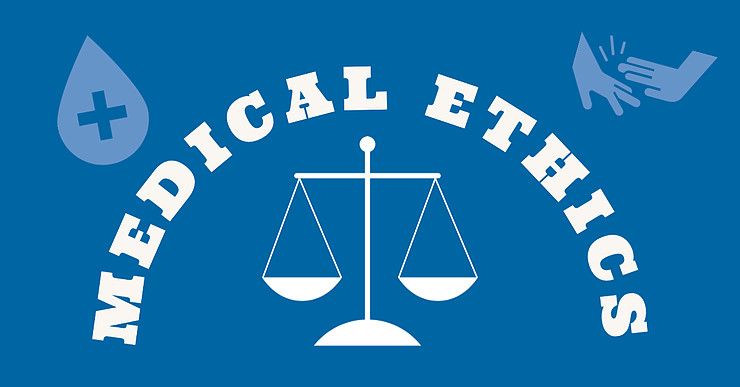Words: Tom Thorne
Ethics are a complicated topic and as such there are many different ethical frameworks. As a basis for medical ethical dilemmas, the following four pillars are a good set to start with when approaching a situation to consider a variety of viewpoints.
1. Autonomy - This refers to the respect of an individual’s wishes and the capacity to direct one’s own life (1). It is the right of competent adults to make decisions about their care, informed by the healthcare team around them. This principle becomes extremely important when dealing with patients refusing life-sustaining treatment. The law surrounding these issues can become extremely complex, especially when dealing with minors in addition to where parent’s/ guardian’s decisions disagree with medical professionals. Read further into CAPACITY and CONSENT if this interests you.
2. Beneficence - In short, this is promoting the course of action, you believe is in the best interest of the patient. Just as equally, it involves ruling out other courses of action which are not the best for a particular patient (2,3). Consider if the option works for the specific patient, if this option would be proportional to the problem and would solve the problem. The idea often comes into play when considering a variety of treatment modalities for a given patient/s - these may not all need the same.
3. Non-maleficence - This is the flip-side to beneficence and relates to the prevention of harm to patients (3,4). What are the risks or side-effects of the varying courses of action? Could you perform what you are proposing competently?
4. Justice - This may often be in contrast with autonomy as it often considers what is fair and balanced from a societal perspective (5). Especially in the UK, the ideas of EQUITY and EQUALITY become relevant, when discussing care, due to our universal healthcare system. Equality is treating everyone the same, with equity ‘levelling the playing field’ for example by giving the poorest more resources, with the aim of balancing society (6). When using the principle of justice, one must consider whether an action is legal. Moreover, one must consider if certain groups have been prioritised and if so was this prioritsation justified?
It is also worth being mindful of the difference between consequentialism (utilitarianism) and deontology. Consequentialism refers to theories that hold the consequences of an action as the basis for moral judgement whereas deontology seeks to examine the goodness that a person fulfilling an action meant to fulfil (7). Deontology is primarily seen as being patient-focused with utilitarianism revolving around society (8).
For a further understanding of ethics, I highly recommend ‘A Very Short Introduction - Medical Ethics’ by Tony Hope (from £1.50 on Amazon at the time of writing or £5.99 for the newest edition), a small pocket size book re-emphasising some of my above points as well as adding more strings to your bow for discussing ethical dilemmas.
References
1. Autonomy or self-determination as a medical student [Internet]. BMA.org.uk. 2020 [cited 25 May 2020]. Available from: https://www.bma.org.uk/advice-and-support/ethics/medical-students/ethics-toolkit-for-medical-students/autonomy-or-self-determination
2. X J. Medical Ethics Explained: Beneficence [Internet]. themedicportal.com. 2016 [cited 25 May 2020]. Available from: https://www.themedicportal.com/blog/medical-ethics-explained-beneficence/
3. Beneficence and non-maleficence [Internet]. Alzheimer-europe.org. 2009 [cited 25 May 2020]. Available from: https://www.alzheimer-europe.org/Ethics/Definitions-and-approaches/The-four-common-bioethical-principles/Beneficence-and-non-maleficence
4. X J. Medical Ethics Explained: Non-Maleficence [Internet]. themedicportal.com. 2009 [cited 25 May 2020]. Available from: https://www.themedicportal.com/blog/medical-ethics-explained-non-maleficence/
5. X J. Medical Ethics Explained: Justice [Internet]. themedicportal.com. 2009 [cited 25 May 2020]. Available from: https://www.themedicportal.com/blog/medical-ethics-explained-justice/
6. Mann B. Equity and Equality Are Not Equal [Internet]. edtrust.org. 2014 [cited 25 May 2020]. Available from: https://edtrust.org/the-equity-line/equity-and-equality-are-not-equal/
7. Guzman C. L03 Deontology vs Utilitarianism, The eternal battle… [Internet]. Sites.psu.edu. 2016 [cited 27 May 2020]. Available from: https://sites.psu.edu/psy533buban/2016/02/05/l03-deontology-vs-utilitarianism-the-eternal-battle/
8. Mandal J, Ponnambath D, Parija S. Utilitarian and deontological ethics in medicine. Trop Parasitol [Internet]. 2016 [cited 25 May 2020];6(1):5. Available from: https://www.ncbi.nlm.nih.gov/pmc/articles/PMC4778182/
